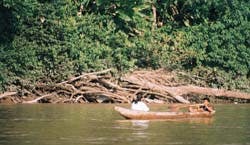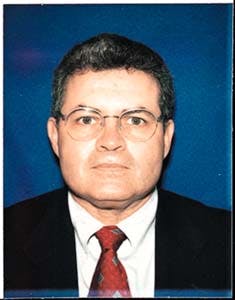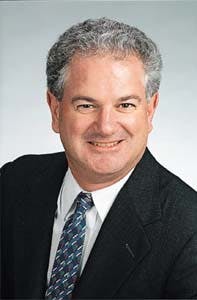Model for relations with indigenous people key to ARCO's Ecuadorian rain forest oil project
Ecuadorian Indians travel by canoe on the Napo River near ARCO's proposed oil field development in Ecuador's Oriente region. Indigenous peoples at first opposed oil field development near their habitat, spurring ARCO to create a new model for environmental/social risk mitigation in the rain forest and setting the stage for an agreement allowing the project to proceed. Photo courtesy of Terra Group.
Sixto MendezOn Mar. 4, 1994, an unusual meeting took place at ARCO International Oil & Gas Co. headquarters in Plano, Tex.
ARCO Oriente Inc.
QuitoJennifer Parnell
ARCO International Oil & Gas Co.
Plano, Tex.Susan Reider, Robert Wasserstrom
The Terra Group
Houston
In attendance were Louis Soileau IV, development manager of ARCO Oriente Inc. (the company's joint venture with Agip SpA in Ecuador); W. Ken Keag, ARCO's resident manager there; Leonardo Viteri and Hector Villamil, leaders of the Organization of Indigenous Peoples of Pastaza (OPIP); and two representatives of Oxfam America, a community development and human rights advocacy group in Boston.
Their discussions lasted well into the night and included subjects as diverse as native land claims, health care, and the lack of adequate schools throughout Ecuador's Oriente region. By midnight, ARCO and OPIP had agreed to begin a serious and positive dialogue about social and environmental questions arising from the company's proposed development of a major oil field at Villano on Block 10, located deep in the forests of Pastaza province (OGJ, Apr. 21, 1997, pp. 37, 41).
This agreement marked a major turning point in the often difficult and contentious relationship that had evolved since 1988 between ARCO and OPIP, one of Ecuador's strongest regional Indian federations. Only a few years earlier, OPIP had demanded a 15-year moratorium on all petroleum activities in Pastaza and had mobilized its many allies in the U.S. and Europe-including the Rainforest Action Network and other nongovernmental organizations (NGOs)-to focus international attention on ARCO's exploration program there.
How this agreement was reached, whether it offers a model for relations between hydrocarbon companies and native peoples elsewhere, and how ARCO has dealt with serious rivalries among competing indigenous organizations are questions that are worth closer analysis and consideration.
Common ground sought
Two major themes emerged at the Plano talks: minimizing the kind of environmental and social dislocation that oil production had brought to other parts of Ecuador and planning for the long-term welfare of native communities in Pastaza."We all agreed that we had no desire to see another Napo or Sucumbios Province," Soileau said, referring to areas in Ecuador that have experienced significant disruption. "But to avoid that, we had to lay out a plan for future resource development there."
Recognizing that other stakeholders should be involved in these discussions, ARCO and OPIP decided to convene a subcommittee with Ecuadorian state oil company Petroleos del Ecuador and two other Indian organizations in Pastaza: the Association for Indigenous Development, Amazon Region (Asodira) and the Federation of Indigenous Peoples of Pastaza, Amazon (Fippra). This subcomittee was designed to resolve outstanding environmental questions and concerns.
A second subcommittee would address the issue of "near and mid-term" community assistance within Block 10.
Finally, a larger group of participants-including perhaps the provincial government and other companies operating there-would eventually be invited to focus on the question of long-term development planning and resource use.
Old rivalries, early dialogue
ARCO managers now acknowledge that they initially underestimated the importance of rivalries among indigenous organizations, which quickly became a serious obstacle to agreement on any of these issues.In part, such rivalries can be traced to long-standing political disagreements between Pastaza's two major federations, OPIP and Fippra. Almost immediately, however, ARCO's own actions in Block 10 unwittingly made this problem worse.
Paradoxically, the bitterest feuds arose from ARCO's well-intentioned proposal to provide basic health and education services to eight small villages near the drilling site at Villano. Anticipating this offer, most of the families living there decided to withdraw from OPIP in 1993 and form their own "independent" association, which eventually became Asodira. As they candidly explained, they left OPIP because they were reluctant to share the proposed benefits with other communities in the province, as OPIP would have demanded.
Understandably, OPIP leaders were furious at this turn of events and blamed ARCO for using "divide and conquer" tactics to undermine their organization. The question of ARCO's support for Asodira-together with a company-sponsored "sell-out" deal for the Villano communities-remained an important irritant in all subsequent discussions for the next 4 years.
Despite these early problems, a meeting involving ARCO, Petroecuador, and the three Indian groups (now known as the "Indigenous Front") took place in Pastaza in May 1994. With the blessing of Energy Minister Francisco Acosta, an agreement was drafted that established a "technical environmental committee" (comite tecnico ambiental, also known as the "technical committee") with three members from Petroecuador, three from ARCO/Agip, and two apiece from OPIP, Fippra, and Asodira.
The committee was given several immediate responsibilities: to define the scope of work for a retrospective baseline environmental impact study (such studies were not required by law until 1994, after ARCO had completed its exploration program); to set the "level of participation of the indigenous organizations" in this study; and to review the qualifications of prospective environmental contractors (as operator, ARCO remained responsible for selecting the winning EIS bidder).
The technical committee held its first meeting Sept. 21-22, 1994, after disputes among OPIP, Fippra, and Asodira forced postponement of an earlier session that had been set for June. From the outset, however, it was apparent that these groups shared an agenda that diverged widely from those of ARCO, Agip, and Petroecuador. Whereas ARCO arrived with two clear objectives in mind-approve a general work plan for environmental studies on Block 10 and agree on selection procedures for potential contractors-OPIP's proposed agenda emphasized very different priorities, including the need to "commit financing for the proposal to develop an integrated indigenous development plan."
Rather than debate this contentious issue, company representatives suggested that leaders from the Indian groups should take it up separately with senior managers at ARCO and Petroecuador. After much negotiation, an agreement was reached that discussions would take place on two parallel tracks. Thereafter, environmental issues were addressed by the technical committee, while questions of financial support and community development were deferred for future consideration by a higher-level group known as the "Political Front." (As it turned out, the Political Front didn't meet until February 1988, largely because ARCO declared force majeure from May 1995 to March 1997 and suspended its activities due to contractual differences with the Ecuadorian government.)
Once the two-track procedure had been established, the technical committee met more or less regularly over the next 15 months to discuss the retrospective EIS. As it turned out, this study, which began in January 1996, and was completed in June 1997, was unsuccessful. Virtually everyone agreed that the initial contractor did not perform well and that key data were missing. After lengthy review and discussion, however, the committee decided that missing data should be collected as part of a more important step: the EIS for construction and operations at Villano.
With committee endorsement, ARCO hired Houston-based Entrix Inc. to conduct this study, which began last September. As part of its assignment, Entrix trained indigenous committee members to monitor its field work and hired 30 additional Indians-10 from each organization-to join its work force in the field.
Both Entrix and the Indigenous Front agree that this collaboration has been successful. Environmental studies for Villano have been completed on schedule and the final application (for construction of oil field facilities and two associated pipelines) is nearly complete.
Meanwhile, political conditions in Pastaza have shifted again with the near-total dissolution of Asodira in February and March this year. In response, the two larger federations, OPIP and Fippra, have supported ARCO's project as all parties move toward the next major challenge in this evolving process: negotiating a long-term economic cooperation agreement for Block 10 and perhaps even other parts of the province.
Report card for tech committee
Has the technical committee been a success? Not surprisingly, committee members offer widely different assessments.From ARCO's perspective, the comite tecnico has accomplished its main objective: to create a channel of communication between the company and indigenous organizations on environmental issues that, if not handled properly, could become an arena for continuing disagreement. ARCO's managers also recognized that once development at Villano began, it would have a major impact on indigenous communities there.
And with Conoco Inc.'s unhappy experience in nearby Block 16 very much in mind (Conoco withdrew from a major oil development on that block following heavy local and international NGO opposition), as one ARCO manager said, "We decided to minimize our environmental and social impact." The technical committee, in the manager's view, would guide them through the mine field of political hazards.
Soileau said, "We wanted to bring indigenous people into the process because they have a lot of knowledge about their environment that no one else has. We also saw that we had an opportunity here to lead the oil industry environmentally."
As for the committee's deliberations, Soileau recognizes that they have been fraught with external politics and internal rivalries. Still, he believes that the outcome has justified the effort: "It was a slow, painful process, but I always felt it was time well spent, that anything we could do to get people to sit down and talk to each other was better than not talking to each other."
Similar views were expressed by Leonardo Viteri, an OPIP leader who several years earlier had led the campaign to prevent Conoco from operating on Block 16: "When we went to Plano, we had several objectives in mind. And one of these was to make sure that our organizations-especially our technical people-would be broadly involved in planning, implementing, and monitoring the environmental management program in Block 10. In our minds, this program had to recognize the fragility and uniqueness of our region and it had to guarantee adequate regulation of oil activity here."
Another significant issue involved "transparency": a willingness on the part of ARCO and Petroecuador to provide relevant information, to put their cards on the table. In this sense, too, Viteri believes that important progress has been made: "I think we have taken big steps toward creating transparency and trust. We haven't completely reached our goal yet, but we're getting there."
Other participants are not so sure. In particular, representatives of Petroecuador and the Energy Ministry question the usefulness of involving non-specialists in technical decisions-for example, about tropical biology, or waste management, or environmental conservation-in which they have little formal training.
Such views were forcefully articulated by one former senior official who had been involved in the technical committee from its inception: "The trouble is that this committee quickly became just another political forum. After all, companies like ARCO can't operate in Ecuador unless they meet strict environmental requirements that are set by law. We really don't need another kind of review by groups or organizations that have no technical qualifications."
Similar opinions are widely shared by specialists in Petroecuador. "We're still waiting to see if these dialogues really bear fruit," one of them said recently. Now that Villano development is proceeding, he added, the dialogues will soon "be tested in the line of fire."
ARCO managers acknowledge these concerns, which arose in part because their contract calls for the Ecuadorian government to resolve disputes with native communities (among other issues). From this perspective, the dialogue has been challenged as a wasted effort and unnecessary. In practice, however, it is up to ARCO to solve such conflicts; company officials in Ecuador firmly believe that continuous confrontation and conflict will not allow them to work effectively in Block 10. In the end, they point out, "common sense and good business drove us."
A new model
What have members of the technical committee learned from 3 years of dialogue and discussion? And can these lessons be applied elsewhere? Participants emphasize three points: Face-to-face discussion has laid the foundation for resolving major issues. Despite false starts and missed opportunities, the technical committee has provided an arena where OPIP, Asodira, Fippra, ARCO, and Petroecuador have learned to look past fundamental differences and find common ground. This achievement is significant, as one independent observer explained, because many committee members have had to learn that one group's gain is not necessarily someone else's loss. Moving from a political calculus ("if you win, I lose") to the premise of most successful business negotiations (everyone must win) represents an essential step in reforming the "culture of confrontation" that has traditionally prevailed between oil companies and indigenous people in Ecuador and elsewhere in Latin America.
Oil companies need to be more discerning about local politics. Like most oil companies, ARCO was slow to recognize, as one manager put it, that "working in Ecuador is not the same as working in West Texas." Originally, senior staff members took the position that, in effect, once their contract was signed, working in Ecuador should be like working in Texas. "When foreign companies come to Ecuador," one deputy energy minister recently observed, "they have absolutely no understanding of politics here. In fact, they don't want to understand. They think it's not their job." This view was often encouraged by Ecuadorian officials, who have traditionally found a variety of reasons to leave native organizations out of the discussion about development in Block 10. In contrast, continuing dialogue has now enabled ARCO to develop its own perspective on the interplay among native communities, environmental groups, the national government, and other stakeholders in Pastaza. Rather than depending on Petroecuador or someone else to run interference for them, ARCO managers have taken the initiative in trying to balance the conflicting demands that have arisen in Block 10.
The technical committee has allowed stakeholders to separate true environmental issues from other concerns. Throughout Latin America, native organizations, environmental groups, and other NGOs have often raised environmental objections to oil projects as a way of focusing public attention on social and economic questions. In general, this strategy has paid off-but at the price of confusing real technical problems (which engineers are trained to solve) with thornier debates over sustainable development, stakeholder equity, and grassroots participation. Unlike many companies, ARCO did not try to sidestep such discussions, but rather it was eventually able to separate them and then address them systematically in different forums. By providing technical training for indigenous organizations and their members, ARCO has also helped them to distinguish between real threats to the rain forest and more routine environmental challenges. This approach has ultimately reduced the number and range of technical issues that remain to be resolved, while strengthening the Indians' overall capacity to negotiate as partners in Block 10.
Finally, there is the question of sustaining a process of continuous dialogue. Despite their success in building consensus on environmental issues, ARCO managers also acknowledge that they committed significant oversights. In particular, they point to the period of force majeure, when ARCO reduced its activities in Ecuador to a minimum. Although they continued to meet with the technical committee, they insisted on postponing any discussion of long-term development options or plans-the very questions that most concern indigenous leaders.
In retrospect, according to Herb Vickers (ARCO's current manager in Quito), the decision to focus exclusively on technical details at this point was a mistake. "ARCO compromised the effectiveness of our initial agreement, because we waited for 3 years to talk about the most important issues," he noted. "This has created an atmosphere of mistrust."
The outcome has been troubling: "Every new piece of work we undertake, every time we need to go into the field, requires new negotiation." At present, this situation is slowly being resolved as ARCO moves toward development of Villano field.
Perhaps the most far-reaching question was raised by Leonardo Viteri. Why, he asked, don't oil companies try to understand the social and natural environment for proposed projects "before they even buy the bidding packages"? ARCO officials believe that beginning such discussions as early as possible is the key to a successful venture in sensitive, remote, or frontier areas.
Meanwhile, the technical committee, with all of its imperfections, has played an enormous role in demonstrating that dialogue benefits all major stakeholders in Pastaza: ARCO, its partners, the Ecuadorian government, and native communities.
The Authors
Sixto R. Mendez is Manager of Environment, Health, and Safety for ARCO Oriente Inc. in Quito. After working as an industrial hygienist at ARCO's Houston refinery, Mendez moved to ARCO Solar Inc., where he served as a safety and environmental engineer and subsequently as manager of the safety and environmental protection group. He later joined the U.S. upstream division of ARCO Oil & Gas Co., working first as the director of safety, environment, and training at Plano, Tex., and then as the manager of health and environmental protection in ARCO's divisional corporate office in Dallas. In 1991, he transferred to Alaska as director of EH&S risk management; 2 years later, Mendez returned to Plano to occupy a similar position at ARCO International Oil & Gas Co. He has master's degrees in public health and environmental sciences from the University of Texas School of Public Health, Houston.
Jennifer A. Parnell is a senior environmental engineer for ARCO International Oil & Gas Co. in Plano, Tex. She works on environmental protection, health, and safety issues for ARCO E&P activities in South America. Prior to joining ARCO, she worked for BP Exploration in Alaska for 6 years, focusing on environmental issues and North Slope E&P operations. She also worked for 6 years in legislative affairs in Washington, D.C. She has a B.A. from Duke University and an MA from George Washington University. Her current work includes projects in Venezuela, Peru, Brazil, Colombia, Trinidad and Tobago, and Ecuador.
Susan Reider, vice-president of The Terra Group, has over 20 years of legislative and political experience. She has worked extensively with nongovernmental organizations and has assisted energy companies in winning local support for major capital projects. At present, she is advising several oil companies in Latin America. She holds B.A. degrees in public communication and political science from Syracuse University.
Robert Wasserstrom, president of The Terra Group, Houston, has spent more than 25 years working with native communities, environmental groups, and other stakeholders in Latin America and the U.S. He served as vice-president of public affairs at Browning-Ferris Industries in Houston before founding The Terra Group with Susan Reider in 1993 to help energy companies manage their stakeholder relations. He holds a master's and a Ph.D. in anthropology from Harvard University.
Copyright 1998 Oil & Gas Journal. All Rights Reserved.




